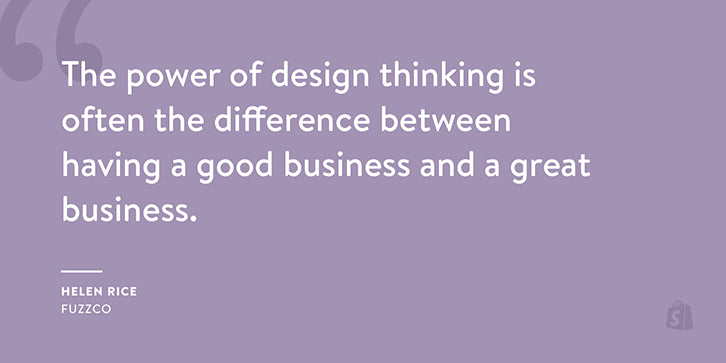On my walk to work, a runner whisks past me on the left. She’s a blur of snug-fitting black and fuchsia performance fabric. At the intersection of the crisscrossed straps of her top, is a small, almost undetectable reflective checkmark.
That checkmark, dubbed the “swoosh” is the symbol of one of the most iconic brands in history. The wearer of this particular instance of the Nike logo embodies everything the brand aims to convey: strength, endurance, motivation. It’s not a check mark. It’s an incentive to run one more mile. It’s teamwork and sportsmanship. It’s a reminder to “just do it”.
When does a sneaker become more than a sneaker? What makes a consumer choose one seemingly identical gown or coat or swimsuit over another? Emotion. Fashion branding at its best, speaks to its intended audience like a BFF – it, like, really gets you. And in fashion, it stands up for you, becoming the outward-facing expression of your personality.
For small brands and emerging designers, widespread logo recognition is an unattainable (or at least very far-away) goal. But branding is more than a logo. It encompasses values, voice, and design choices that run like a continuous thread through product and packaging and online presence. Good branding is storytelling – a consistent and continuous message, weaving meaning into every piece.
How do your nail branding for your own label? We connected with 14 seasoned entrepreneurs, marketers, and journalists to get the goods on fashion branding:
1. Joey Ng
VP of Marketing, Output
“Branding in fashion is key to helping the customer solve the problem of expressing their individuality within the context of assumed dress codes. If you can’t communicate who you are as a brand and the type of person who would identify with your core values and aesthetic, then you won’t be able to sell it to them.”
“Whenever I approach a new brand or business that I’m working with, I always start with describing it in 3 words (or less!). Take the time to brainstorm every single adjective that you believe belongs in the world of your brand. Then keep eliminating them until you have 3 favorites left. I went through this branding exercise for a record label’s merchandise arm and we landed on “Y2K B.E.T.” In just 2 words, we had pinpointed the permeating theme of all the visuals, sounds, textures, and feelings a consumer would experience when engaging with their brand. Find your niche and define in very few words what makes your brand distinctive, then Pinterest and Tumblr away. If something doesn’t fit those original 3 words – even though you might like it – scrap it. Establish the core message, nail it, then expand.”
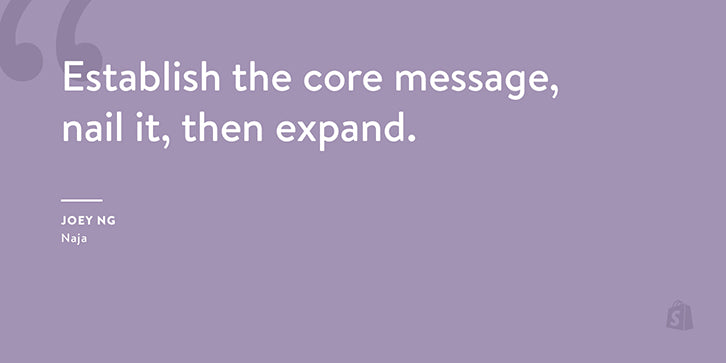
“Here’s a test: if you cover up the logo or name in the ad, can you still name the brand? Classic fashion ads from Benetton, Calvin Klein, and American Apparel come to mind for nailing this test. If you can spot the billboard image from a mile away without seeing the small print and know who is speaking to you, that’s effective branding. A lot of branding from emerging fashion, streetwear, or start up companies are becoming so interchangeable nowadays. How do you get your consumer to feel something differently instead of glazing over in the infinite scroll of their social media feeds?”
Here’s a test: if you cover up the logo or name in the ad, can you still name the brand?
2. Yan Wang
Founder, XYZ Impression
“Great branding can help with larger profit margin. There are a lot of identical items in the fashion industry. Often times, people are purchasing more for the label than for the actual product.”
“People spend more time with their computers and phones. Digital marketing is huge in today's market. That's why great online presentation and content is key for people to remember you. For startup companies, a good way to get traffic is through working with social influencers. It's all about finding your niche market and exposing a good quality product or service to them.”
Often times, people are purchasing more for the label than for the actual product.
3. Gail McInnes
Co-founder, Stylist Box / President, Magnet Creative / Editor-in-Chief, The Pull Magazine
“Having a strong brand with compelling messaging helps customers connect to the clothing and accessories they wear. If a consumer relates to the brand, it creates a connection; the wearer feels as though the brand is an extension of themselves or at the least what the wearer would like others to perceive in them. What we wear plays a big part into how we are perceived straight off the bat. As much as we'd like to think otherwise, first impressions do count.”
Branding should be established from the start; from the overall look of the product to social media content to how customers experience and shop the brand, but it needs to be consistent from the get-go. If you are an exclusive luxury brand, your language and imaging needs to reflect that luxury feel and voice – using blacks, golds and more refined and elegant language and tone. If you are an independent, ethically-sourced brand, you may want to use softer colours in your marketing material and have a softer tone in anything written.”
First impressions do count.
4. Dawn Del Russo
Fashion & Lifestyle Expert, Founder Bella Dawn & LiveTheGlamour.com
“Branding is everything in business, especially fashion. It is part of the statement you make. It defines the brand more clearly. Keep your brand consistent on all social platforms. Consider the look, style, color of your branding – how are others affected by it? When starting out, ask what is the first thing someone thinks of when they see your brand. When you do finally have your brand image, get it out there. As much as you think you are marketing yourself, you can triple it.”
Keep your brand consistent on all social platforms.
5. Leanne Mai-ly Hilgart
Founder, President & Creative Director, Vaute Couture
“Fashion is an outside expression of who you are on the inside. So branding is everything for fashion. It's how you shout to the world: if you're like us on the inside, you might express that in the same way on the outside. For us, in production, it's with ethical textiles, treating and paying workers fairly, fittings with an all female team trying things on our bodies. It's serious, it's playful, it's geometry, it's nature. It's vintage-inspired and the future too. We are all about dichotomies and having it all. Being vegan isn't a sacrifice. Caring isn't a chore. It's empowering.
We can't outsource our voice. It's our heart it's our soul, it's our story. It's important to ask yourself as a label “what do I have that big corporations don't?” Where do we win naturally where they will try to fake it and always fall short? This is where you have to go loud. We are here as activists who want to change the world of fashion for animals. We are currently an all female team in Brooklyn doing our best with limited resources. And it's fun and it's challenging. We find inspiration everywhere and our processes are experiments. And we love it. And this is what we can share that a big company cannot.”
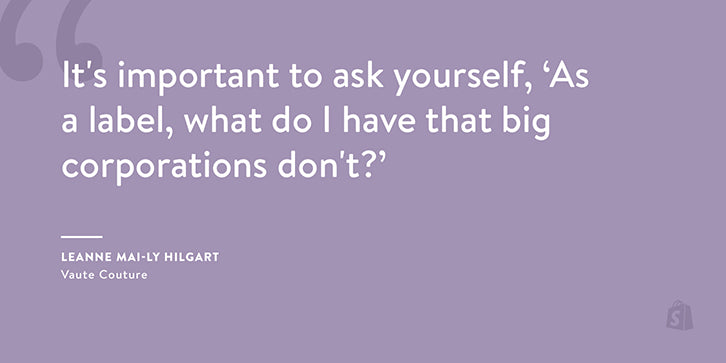
6. Chris Ngo
Owner, The Leverage Showroom; Co-Owner, Embellish NYC, Haus of JR, Crysp Denim, Lifted Anchors
“Social media plays a big part in branding and it’s also the most inexpensive way to build a brand. You can reach a big demographic and audience virtually free. A garage t-shirt company that prints on a blank can build a following based off of their own Instagram. Instagram is the new print ad, it’s the new commercial in which you can utilize your followers as customers.
Today in this fast fashion market, they want to see what’s in now. So many brands are hopping on trends and pushing similar looks that it’s all about who’s first to deliver and first to market. But it’s not who makes it first – it’s who makes it better.”
It’s not who makes it first, it’s who makes it better.
7. Carolyn Delacorte
Co-founder, Boxwood Press
“Fashion has long been an aspirational industry – many brands, from Chanel to Anthropologie, have developed a cult following so robust that just the mere sight of a logo inspires a feeling of tribal belonging. Nowadays, a collection is more about culture than it is about draping and perfectly sewn seams. With bloggers and reality TV stars usurping influence away from conventional magazines, TV shows, and celebrities, an infusion of meaning has come to surround each popular brand. The person who faithfully carries a Louis Vuitton bag is often expressing a statement about wealth and class, while the J Crew devotee is probably more about creativity and trend. These are all messages that have been expressed through branding and morph into a personal message for each consumer.”
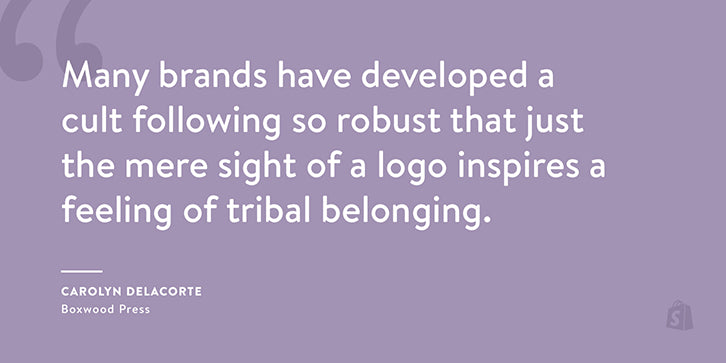
“Over the past ten years or so, we’ve seen a dramatic uptick in the number of fashion companies enter the marketplace. Differentiating a line from a plethora of similar brands is more of a challenge than ever. Unless there’s a frame of reference to attach to a name, it’s really difficult to navigate the congested buyer’s marketplace of boutique and store buyers. Buyers invariably want to introduce lines to their retail floors that will sell through quickly, and the fastest route to clearing racks is to ensure that there is a ton of brand recognition for a particular audience.
Trying to be everything to everyone is a recipe for disaster unless your brand has many, many extensions. Know who your buyer/consumer is and play to the elements of pop culture that appeal to them. This takes a fair amount of market research and marketing discipline, and does not happen overnight.”
Trying to be everything to everyone is a recipe for disaster.
8. Madelyn Chung
Style Editor, The Huffington Post Canada
"A great example of a brand that understands the social media scene right now is Calvin Klein. How many people do you see on Instagram posing in the classic cotton sports bra and underwear, tagging #mycalvins? By enlisting the "it" models and celebrities of the moment (Justin Bieber, Kendall Jenner) and social media influencers to promote their brand in a simple, yet fresh way, they created a want in the market that would eventually turn into free press and advertising. And, their latest campaign features such a diverse cast of individuals, more and more people feel like they too, can rock their Calvins with pride and confidence."

Free Reading List: How to Brand Your Business
A great brand can help your products stand out from the crowd. Get a crash course in small business branding with our free, curated list of high-impact articles.
Get our Branding reading list delivered right to your inbox.
Almost there: please enter your email below to gain instant access.
We'll also send you updates on new educational guides and success stories from the Shopify newsletter. We hate SPAM and promise to keep your email address safe.
9. Odessa Paloma Parker
Fashion Editor, The Globe and Mail
“Branding is important because it helps tell the story of your product - it communicates what your values are, your perspective, and helps illuminate small character elements that are part of the bigger picture of your business.”
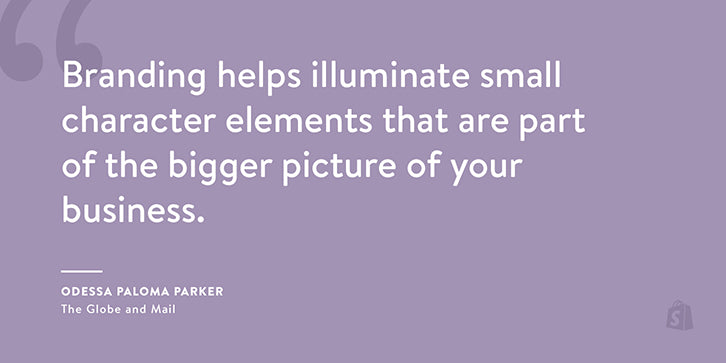
“Take your time! I feel like creatives and entrepreneurs rush themselves because we all operate at such a crazy pace these days. If your business and brand are something meaningful – and creating such a thing doesn't happen overnight – then the world can wait, because it's worth it.”
10. Nick Ede
CEO, EastofEden London
“Fashion is all about identity and establishing a strong tone of voice that makes you stand out from other brands. It is one of the most competitive markets and important for brands to understand who their target market is, what they want to provide their customers, and how to become the go-to place for fashion fans. Its also important to look at how a brand can evolve."
"My advice to new brands it to carefully research your target market and see who your competitors are. Having a strong social media presence is a must – this can be a really cost-effective way of selling product and communicating to your target customer. It’s very important to look at price point – if you are high end you still need an affordable item that can get featured in shopping pages, as more and more glossy mags will look for products under 200£.”
11. Helen Rice
Creative Director & Co-founder, FUZZCO
“Fashion is constantly changing, so it's important for brands to work hard to establish and defend their niche in the changing landscape. Due to the dynamic nature of fashion, brands must be incredibly aware of themselves and the market. Their ability to embody the lifestyle that their audience aspires to is developed through every decision the brand makes, from choices in materials, design, production, customer service, cultural associations, etc. All of these things inform the relationship that the brand has with consumers."
"Brands should consult with a branding agency right in the beginning. This allows the brand to gain insights into the best strategy for the shopping experience, merchandising, positioning, voice and tone, and visual balance between the graphic identity and the product."
"We see the best results when the relationship between the brand and agency continues for the life of the brand. The agency can really help the brand navigate the changing landscape of the fashion industry. Having been there from the beginning, they are deeply familiar with the history of the brand and it's original intentions. The agency can help the brand navigate challenges, as well as point out when there need to be realignments."
"Now that so much business is happening online, creating interesting content is becoming more and more important. This is where an agency can help a brand realize its full potential. We believe that the power of design thinking is often the difference between having a good business and a great business.”
Brands should consult with a branding agency right in the beginning.
12. Andrew Coimbra
Creative Director & Designer, Andrew Coimbra
“The most important thing when starting your own label from scratch would be to know your brand. People always think that they know what they are aiming at, and what vibe appeals to them, but people rarely consider what that means beyond the basics. Who are your clients? What is your ultimate objective? Where do you see your label in 5 years? 10 years?"
"These questions feel like cliches from a high school business class, but at the end of the day they offer core concepts that define the direction of every single step you decide to take in producing and promoting your business. The answers to those questions act as everyday tools to accomplish your goals."
"Part of knowing your brand is knowing who can help your brand. I've been extremely lucky in growing really special friendships with people in my life who I can trust and whose perspectives are well-curated and valid. I would suggest finding a core group of friends, or a "team" of people who have skills that are not only beneficial to you, but are beneficial to them, too. Grow and learn with each other."
"Proenza and Celine, brands that have proven longevity, have both achieved particular success in the luxury division, and although their collections are distinctive season to season, they still maintain a really great balance of continuing a staple carry-over/through. Beyond that, their branding has evolved in a way that feels natural to their brand, and reflective of their values."
Part of knowing your brand is knowing who can help your brand.
13. Sara Koonar
Editor-in-Chief, 29Secrets.com
“When most shoppers are faced with a choice, whether to buy this black tote bag or that black tote bag, they'll choose the one they've heard of. It's as simple as that. That's the entire basis of advertising. So getting the word out there about your brand and what makes it unique it crucial to your sales. And sales are crucial to keeping your business afloat.”
“Lost-cost, guerilla marketing is better than it's ever been with social media. You don't need to place expensive print or television ads to get the word out about your fashion line. Collaborating with influencers or creating your own social media brand can be very effective in building business. Plus, you can keep it local and have a closer relationship with those people endorsing your brand. Of course there are benefits to having an expensive PR firm and schmoozing fashion stylists to get your clothes on the backs of A-list celebrities. But, you'll be surprised how influential these social media stars can be.”
When most shoppers are faced with a choice, whether to buy this black tote bag or that black tote bag, they'll choose the one they've heard of.
14. Alex O'Byrne
Director, WeMakeWebsites
"Building a fashion business is all about creating a brand. Sure, the product is important, but the brand is much much bigger. Ask yourself this: do people buy Nike sneakers because they’re better than other sneakers? No. They buy them because Nike has created an extremely desirable brand; they buy them because they’re cooler; they buy them because of what wearing Nike sneakers says about them — and they’re happy to pay a premium to do so. A great example I like to use when talking about building a brand is P&Co. Take a look at their Instagram – the bikes, the beards, the coffee, the tats; they’ve nailed the hipster look. And all you need to do to become a part of their cult brand is buy one of their t-shirts."
"First of all, be able to describe your fashion brand in a few words. No one seems to really be able to do this these days. You need to know how your brand makes your customers feel. Branding needs to be about the emotional experience for your target audience. Exceptional branding provides a sense of comfort, acceptance, yet inspiration to keep your clients coming back for more each season. These three questions are a good place to start: What do you want your brand reputation to be? What are your brand's core values? How does your brand want to be visually seen? Once you’ve answered these, then you need to start executing on them."
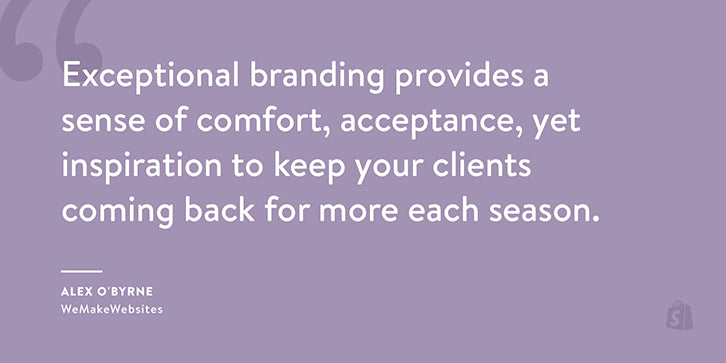
Have your own fashion branding tips to share? Leave them in the comments below!


